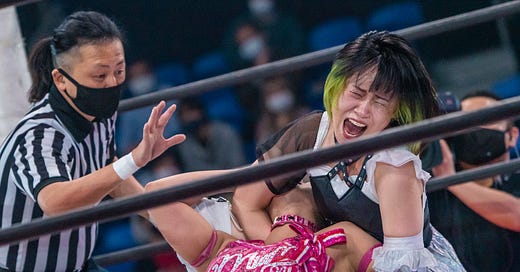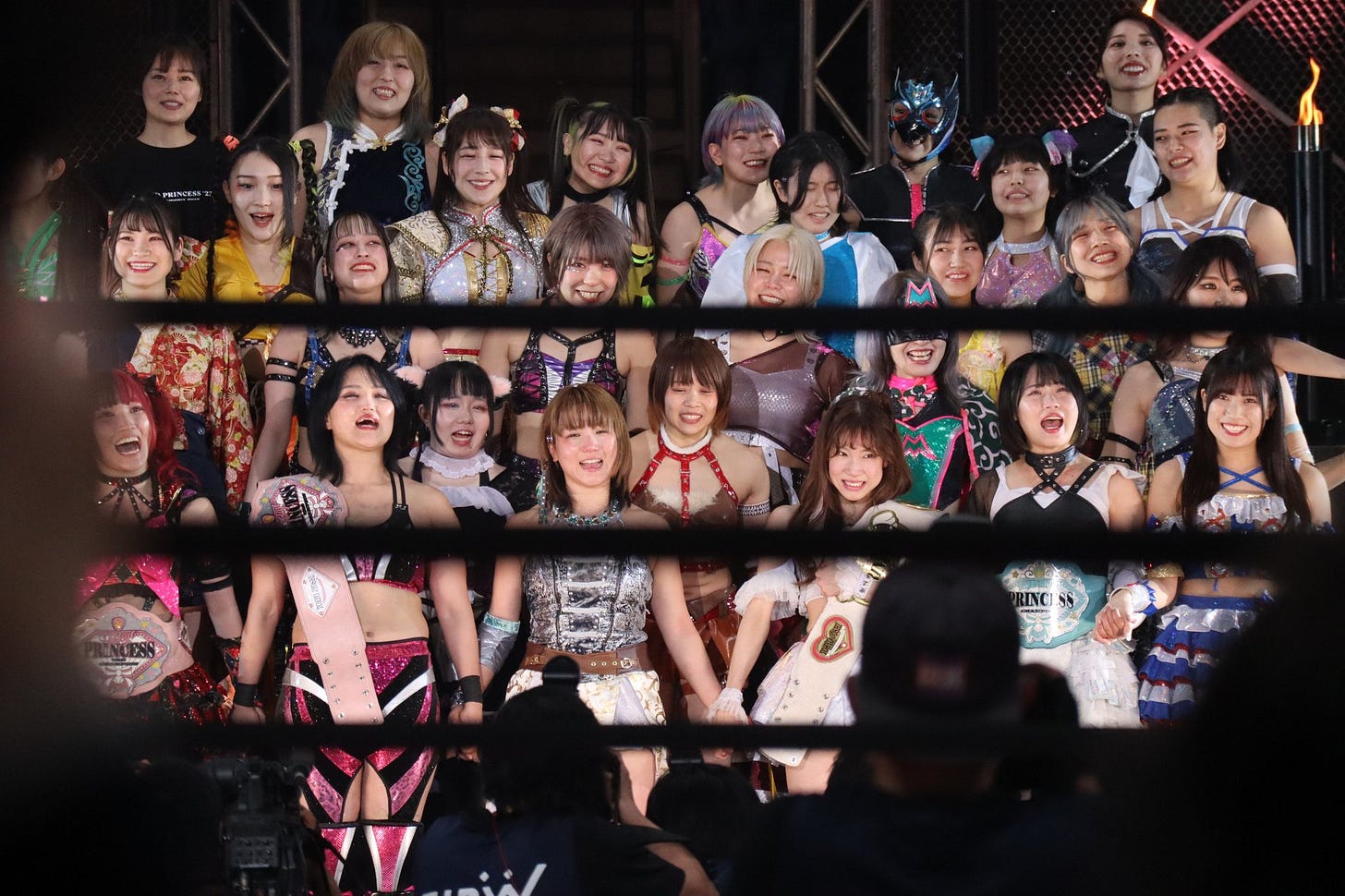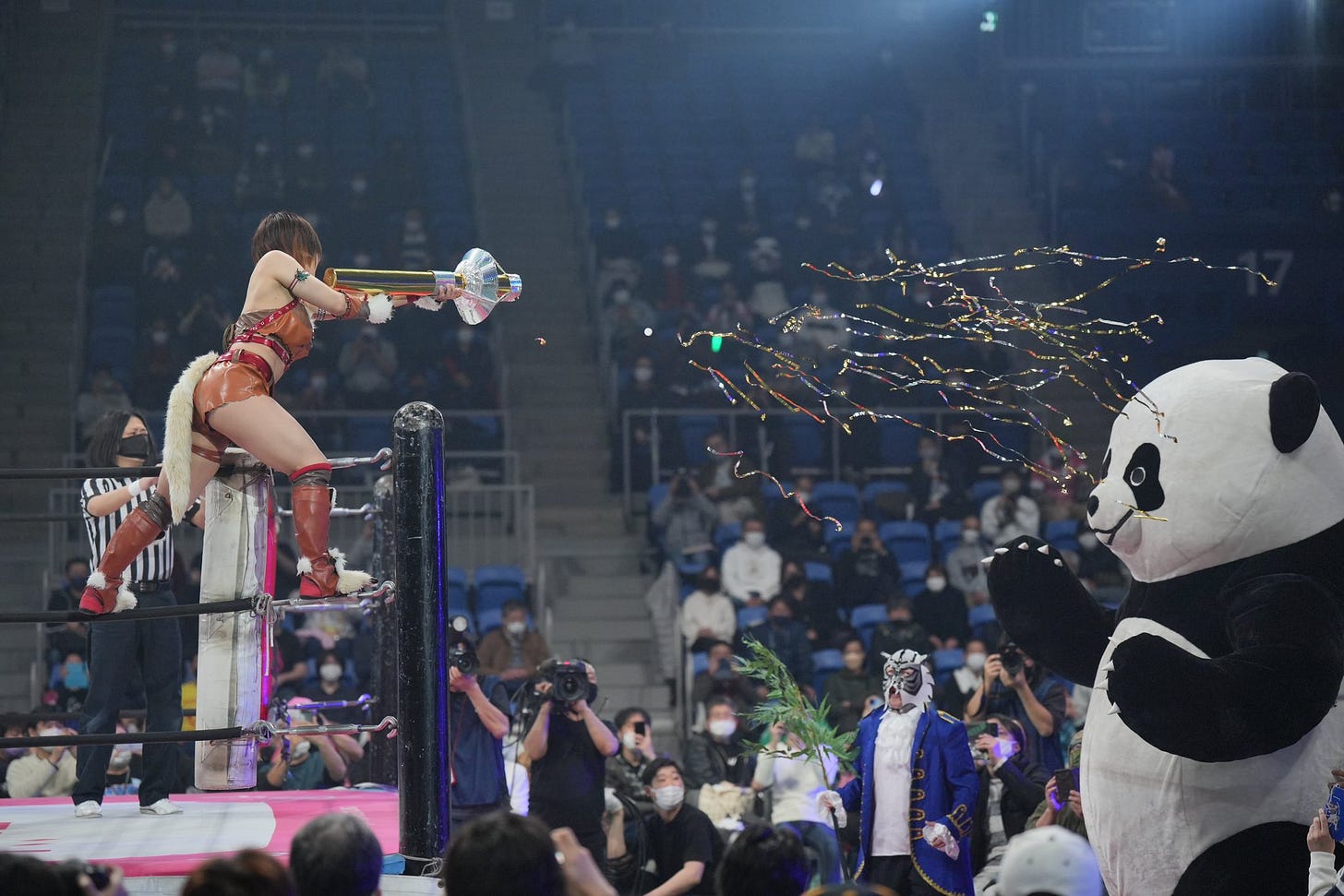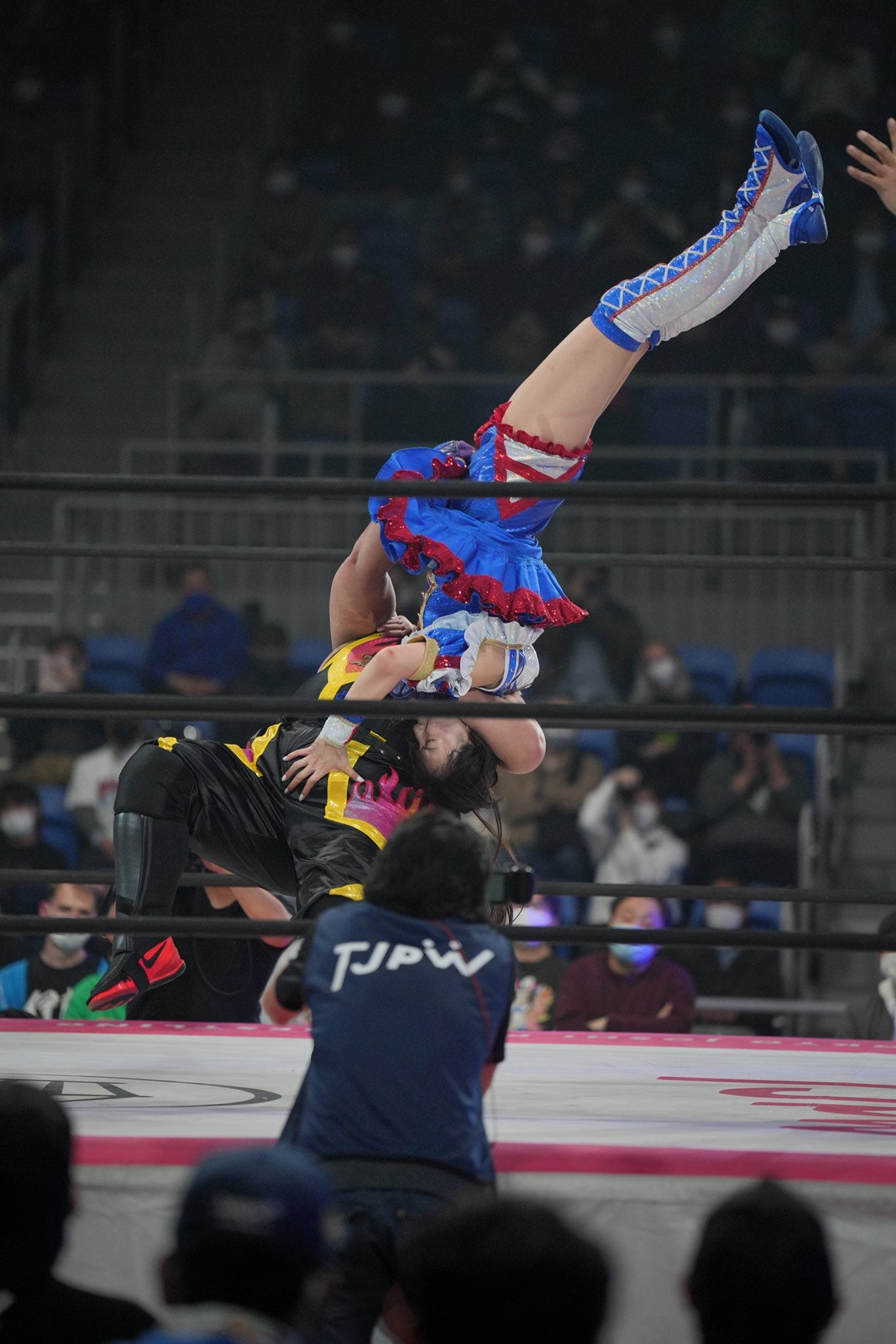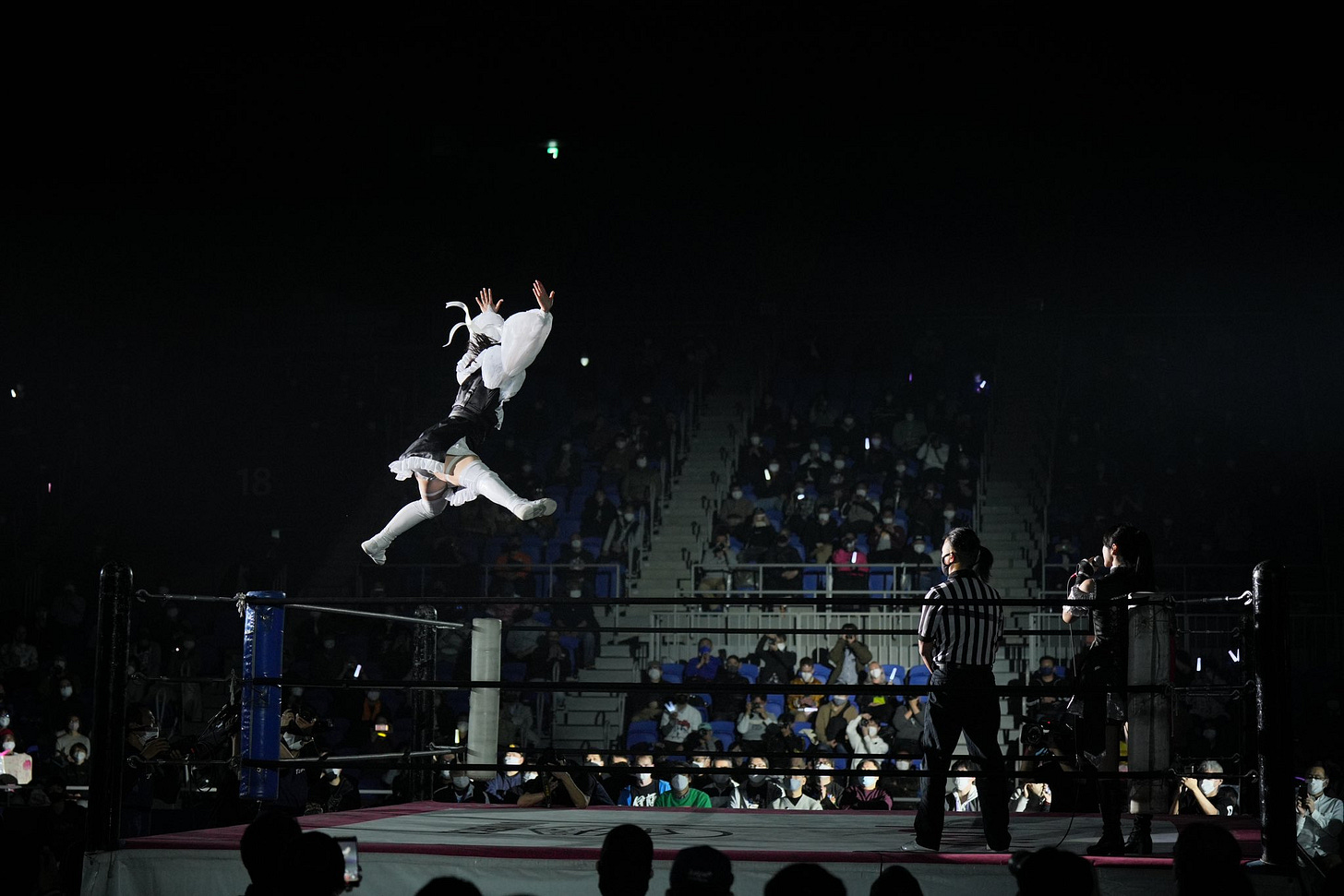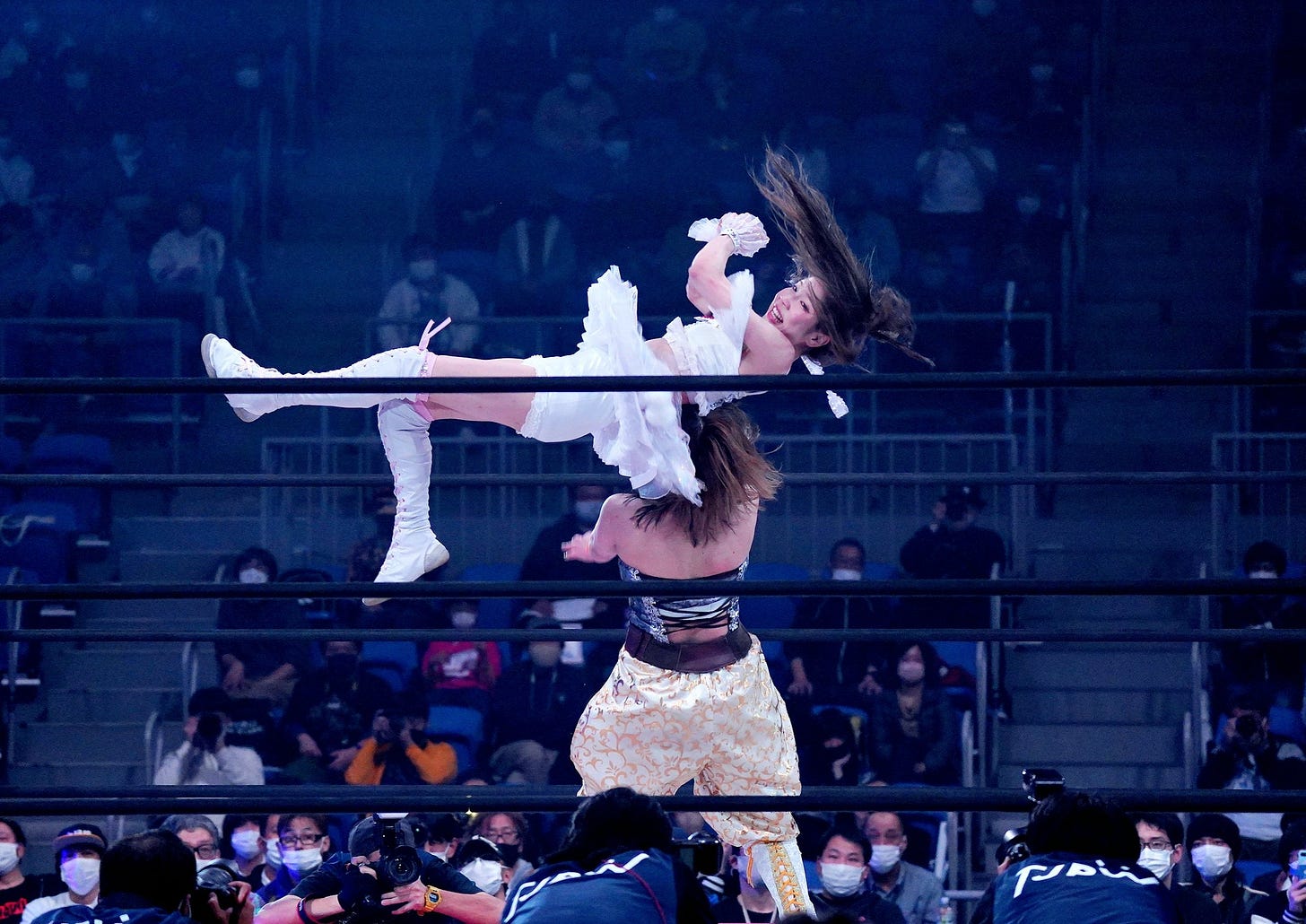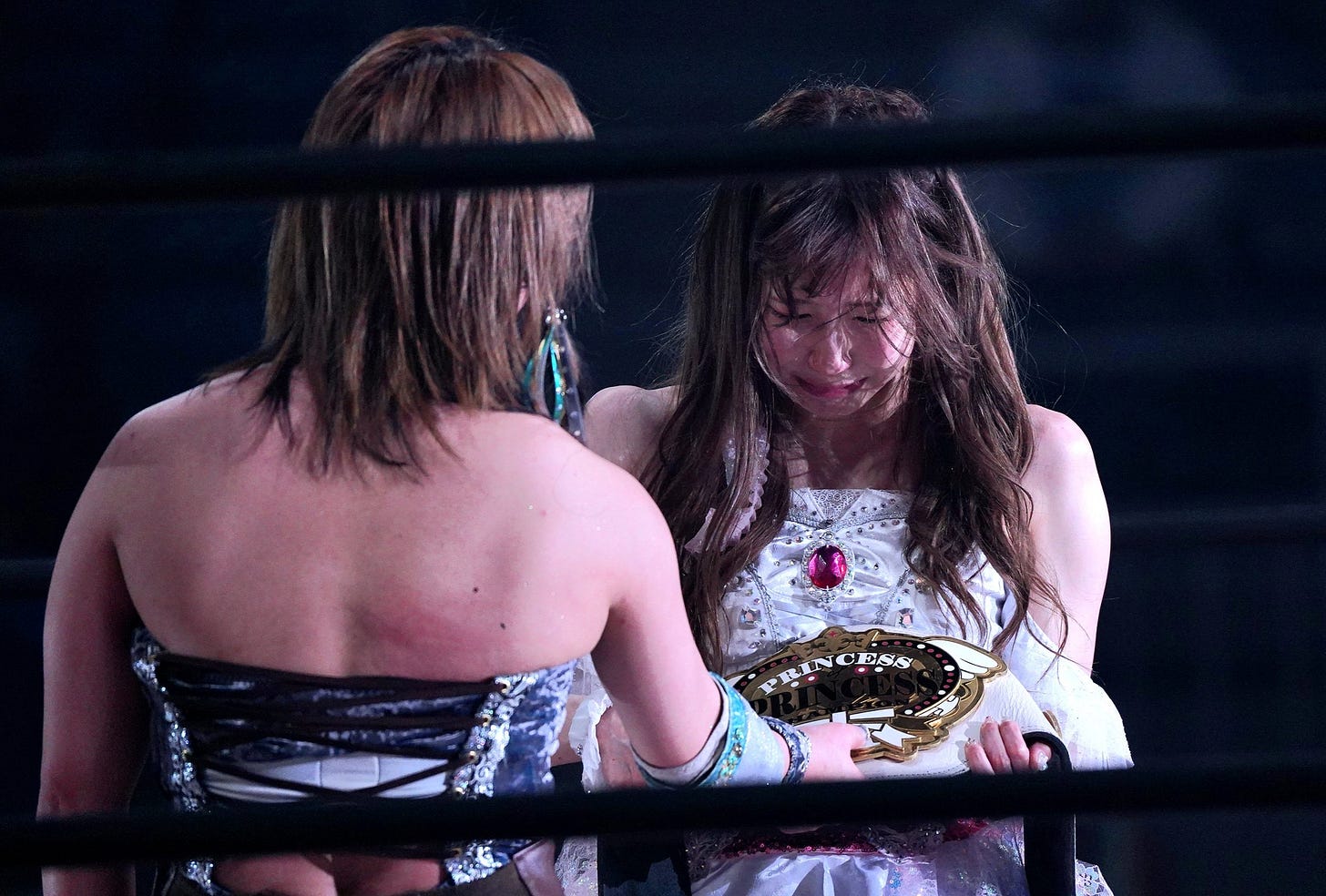Front Matter
Each image used in this newsletter is linked to the Twitter account responsible for it: simply click through to bring up the original post. If you are a photographer whose image I have used here, and you do not grant me permission to reproduce your work, please let me know (Twitter: @FlupkeDiFlupke) and I will remove it. Thanks!
写真家さん、ここにイメージが写すことが許可しなければ聞いて下さって私は大至急除きます (ツイターの @FlupkeDiFlupke です)。ありがとうございます!
The Michelin Guide Star System
One star - Very good
cookingpro wrestling in its category.Two stars - Excellent
cookingpro wrestling, worth a detour.Three stars - Exceptional
cuisinepro wrestling, worthy of a special journey.
(Or, to break it down a little further, three stars means a match which I’d include in a review of the decade at large, two stars means a likely place in my end-of-year top 10, and one star means a match that was notably well executed from start to finish, without necessarily transcending its context.)
This should be read as a companion piece to yesterday’s review, adding a few longer-form thoughts to Stuart’s comprehensive (read: too long for email) overview of Tokyo Joshi Pro’s biggest ever show. And while you’re here, why not also check out Friday’s Grand Princess preview, featuring words from a colourful cast of Marshmallow Bomb contributors old and new?
Subscribe now!
Subscribe to Marshmallow Bomb for free to receive all our posts direct to your inbox, or donate $5 a month to access the full archive. A portion of every subscription supports Amazon Frontlines, an organisation dedicated to working with Indigenous peoples to defend their way of life, the Amazon rainforest, and our climate future.
Kyoraku Kyomei (Hyper Misao & Shoko Nakajima) vs. Neko Haruna & Andreza Giant Panda
It’s difficult to know what to say about this match on a platform like this. I'm a great admirer of nonsense wrestling, but I also have a tendency towards what some might call over-analysis, and this was a match whose finish involved a Giant Panda getting a lightsaber shoved up his ass. What is there that I can say that won’t just get in the way of appreciating this match for what it was? It was a low-budget kaiju movie where Shoko Nakajima shot her enemy with a lazer cannon. It was also a tag team match where Andreza was at one point filmed banging on the apron in support of his partner, the shortest member of the TJPW roster.
If there’s one thing I can say without fear of redundancy, it’s that this match represents a new entry into the “weird Japanese wrestling” canon, and for that I’m oddly proud. The act of discovering or being introduced to Kota Ibushi vs Yoshihiko can be an important rite of passage for wrestling fans that are just beginning to dig deeper. A tweet about Tsukasa Fujimoto vs Tin Tin in 2019 was easily the most successful post I’ve ever made, drawing comments from people who’d never even considered the words “Japanese” and “wrestling” as belonging together. When matches like this land, they have the power to impact audiences far beyond those that would typically tune into TJPW, even given its surging popularity. And now, five years on from the Jun Kasai match which first revealed Hyper Misao’s galaxy-brain potential to those in the know, she now has her own place in the Weird Japan pantheon.
This might not even count as Misao’s definitive match - you’d be hard pushed to beat her 2020 “retirement match” on that front - but it does feel like the one that’s most likely to be relayed to me via a friend in a non-wrestling related WhatsApp group. It’s built, not unwisely, around a series of spots that all have seemingly limitless viral potential. There are innocent people sitting minding their own business right now that are about to see a clip of a superhero running over a Giant Panda with a souped-up bicycle in front of 1500 fans in a Japanese tennis arena, and they have no idea what kind of life is waiting for them on the other side.
Michelin Guide Star Rating: ☆
Yuki Arai vs. Aja Kong
Our preview claimed that Yuki Arai had a less than zero percent chance of winning here, and our preview was correct. But what Arai did manage to do here was to make Aja Kong look vulnerable, and that’s a pretty outstanding feat. It’s not just that Arai showed heart and passion and gave a good account of herself; it’s not just that Arai forced Aja to take a rope break after two successive Finally kicks. Look at Aja when she has to pop up to break the twenty count at the last possible second: she’s hustling. This inhuman killing machine is actually having to pysch herself up, so as not to slip on the banana skin laid in her path by an active pop idol who was born when Aja had already been wrestling for more than a decade. There’s pathos to Aja’s fight to beat the count, if you squint hard enough. Rare territory indeed.
The fact that Aja responds to this near slip-up by repeatedly smashing Arai in the legs with her trusty metal bin just compounds this sense that the veteran is rattled, paying off her absurdly respectful pre-match comments about needing to be on her A-game to put Arai away. And it might be cold comfort for Arai, but the performance she put in here - a performance which took her closer to victory than I was expecting even from a match whose only realistic possible storyline was “Arai runs Aja close” - confirms her not just as a capable, heartful fighter but as a smart one too.
Like Rika Tatsumi, Arai has developed an understanding for the value in honing a small array of really effective move and hitting them whenever and wherever you can. She’s also picked up a veteran’s killer instinct from her tag title run alongside the vastly experienced Saki Akai, who was always working to ensure that both she and Arai were in the right place and the right time. I think Arai can challenge for the Princess of Princess title, if not right now then at least within the next year or two, and what’s more, I think she can win. I think that Aja Kong thinks this too.
Michelin Guide Star Rating: ☆
Miu Watanabe vs. Rika Tatsumi
Right down to its final denoument, this was a match where both outcomes felt not only possible, but correct and interesting too. If Miu wins, it means she’s got last summer’s senpai-killing streak back on track, only this time its with the added prestige of a successfully-defended championship belt. If Rika wins, she’s the first ever TJPW Grand Slam champion - a suitable prize for a pillar of the promotion who’s nevertheless unlikely at this stage to rack up the kinds of career numbers shared by Miyu, Yuka and Shoko. Sometime when a title changes hands the vanquished party is forced to take a narrative back seat; not so here, where these two tag partners were fully committed to their own, equally compelling, individual stories.
Let’s look at Miu first. This was a match where Miu took all of the experience she’s been storing up since last summer, the Princess Cup run and the International Princess title victories over Alex Windsor, Trish Adora and Janai Kai, and spat out a big show performance that was terrifyingly Ace-adjacent. Fending off Rika’s tactical wizardry with pure power, there were moments here that felt as close to a major threshold-crossing as anything we saw in those matches with Miyu and Yuka last July. Of course, Miu has scored major wins over sainted opposition before, but she’s never done it while looking like this. The moment where she shakes her head following a blocked Avalanche Teardrop attempt and goes back up top to force her way through into hitting the move felt like the actions of someone who already has surpassed her senpais - it’s no longer a question of if or even of when; in fact, it’s no longer a question at all.
It’s an absolutely spectacular fake-out. As per the TJPW main event house style, there weren’t too many false finishes as we moved towards the closing sequences, but what we did have was a sense of a rising narrative - Miu has finally found the stamina and the power to stamp her supremacy over the gatekeeping first generation when it really counts. That would have been satisfying enough as a finish, but, like an Agatha Christie novel, the clues as to how things were really about to go down were there from the beginning. Rika was clever enough to end Yuka Sakazaki’s second reign with the Princess of Princess title, canny enough to put down a challenge from Maki Itoh when Itoh’s momentum was at a career high. Her early, occasionally galaxy-brained work on Miu’s legs (that fake injury spot!) provided her with a safety net deep into the match, and she had no qualms about winning the match ugly: why go high-risk when you can grab a Dragon Sleeper and simply put all your strength and tehnical know-how into keeping hold of it?
Rika is Tokyo Joshi’s first Grand Slam champion for a reason, and if she ended up looking like the underdog following Miu’s onslaught early in the third act, then that’s testament to the quality of selling from both parties throughout. The art of professional wrestling is the art of making people believe in spite of everything they know. In spite of everything I’d seen Rika do in the opening ten-to-fifteen minutes of this match, I found myself believing that Miu still had enough in her arsenal to overpower her. For a few ethralling minutes it felt like Miu’s story, a story of Miu’s unstoppable growth, finally consuming the mentor that moulded her.
But Miu isn’t the Ace yet, and despite demonstrating a confidence that borders on the unhinged during her second comeback sequence, she’s ultimately out-thought and out-manouvered by the more experienced wrestler, the one who’s already experienced what it’s like to stand at the top of the mountain. Not that Rika herself fits the “Ace” bill, either - part of her perennial fascination for me as a fan is the extent to which she’s flown under the radar in her near-decade of work with the company, despite being one of the most reliably intelligent and emotionally convincing big match workers they’ve ever had. True to form, this is without question the most smartly laid-out and emotionally gripping Tokyo Joshi Pro match to ever take place in the semi-semi-main event slot. If the Michelin Guide Star Rating system had half stars I’d give this one on top of what I’ve already given it; as it is, let’s settle for calling it my Match Of The Year at time of writing.
Michelin Guide Star Rating: ☆☆
Yuka Sakazaki vs. Mizuki
There’s a growing genre of matches in TJPW that are hard to describe pithily, but which broadly revolve around a kind of testing of the company’s friendly ethos, a pushing and stretching of its renowned collegiate atmosphere. I wrote in my review of last year’s Grand Princess of a kind of “heavy is the head that wears the crown” moral messaging looming from the margins: in that show’s main event, the reigning champion may have lost her crown because of an excess of respect for her opponent, and may have been happy to see it go. In January, Miyu and Yuka pushed the unwritten rules of the Princess Road almost to breaking point by headbutting each other really hard. And here we were presented with a main event, potentially the biggest in company history, which almost didn’t get going, because its two competitors didn’t want to fight each other.
Yuka and Mizuki love each other - I’m fairly sure we can call it that - and they’ve both experienced at first hand what it means to go all in on your opponent in one of these Princess of Princess title matches. In 2023, winning one of these bouts means taking great risks not just with your own wellbeing but with your opponent’s wellbeing too. And so this match, more than just about any other match I can think of, has an atmosphere hanging over it that we could go as far as to call elegiac. Something precious is going to have to be broken here one way or another, and neither Yuka nor Mizuki have managed to psychologically prepare themselves for what that might entail. Their entrances are tonally at odds with every other entrance on the show - from match one to match nine, every performer that enters looks awed or excited by the occasion, or looks like the best, most match-ready version of themselves. Yuka and Mizuki enter crying, looking a little like they’d rather be anywhere else.
Maybe you can protect your bond if you do the ugly work quicky and efficiently? That’s the train of thought Yuka finds herself going with early on, and there’s several stages of this match in which she’s the opposite of cagey, looking to inflict maximal damage as quickly as possible. This can look functional, as with the submission holds she subjects Mizuki to in the opening exchanges, or it can look spectacular, as when she hits a Magical Girl Splash while Mizuki is still rolling back into the ring following a vicious attack on the outside. The fact that the camera misses Yuka’s set up here only adds to the sense of urgency: get in, get out and get to those post-match hamburg steaks without any broken hearts.
Yuka can only sustain these spells of unbroken concentration for short periods, however, and the atmosphere of regret lingers until the closing sequence of the match. It’s Mizuki who breaks through that atmosphere once and for all, with an insane Whirling Candy that ultimately turns the match in her favour. Though Mizuki clearly shares Yuka’s heavy feelings, she’s also the one with relatively little to lose. She’s less weighed down by the pressure of delivering on the big stage than Yuka is, and her thinking is less muddled. It takes her a while, but she’s able to cut through Yuka’s dominance, and the closing stretches of the match play out at her pace. As it was a year ago, it’s the challenger, not the champion, that’s able to deal out the killer blow here: Yuka may be a terminator, but she’s also a human being, and this is no ordinary mission of destruction for her. In the end, it’s her heart that lets her down.
It’s a simple payoff: Yuka loses because Mizuki wanted it more, which is the kind of narrative we see in real sports all the time. But on the whole this is a more complicated match than the International Pricess title bout, both in concept and execution. Yuka and Mizuki incorporate fragments of the in-ring style we’ve come to associate with this belt, but they surround them with a gloss of character work that treads about as closely to Kenny Omega-ish melodrama as I’m comfortable allowing. And that’s fine: Yuka and Mizuki probably could have had the best straight-up Big Match on the card, but there was no need to tread on Rika and Miu’s toes in that regard, or to force them into going easy and leaving something on the table for the main event.
The quality of big TJPW title matches has been rising so consistently that eventually someone was going to need to do something like this - a match which feels at times like it’s refusing to resolve into a classic TJPW title match - in order to stand out. This wasn’t necessarily the match I was expecting, and it’s not necessarily the direction I’d like all Princess of Princess title matches to go in from this point onwards, though I’d wager the danger of this is slim, given that Maki Itoh is the only wrestler on the roster with whom Mizuki has a comparable history, and their relationship dynamic is completely different. This was more of a lateral move from Yuka’s last defence of the belt than a clear progression, but I’d argue that a touch of the unorthodox was exactly what was called for to cap off a 10/10 card whose four hours flew by without burnout or repetition. This might have only been my third favourite match of the show, but I wouldn’t have had it any other way.
Michelin Guide Star Rating: ☆

